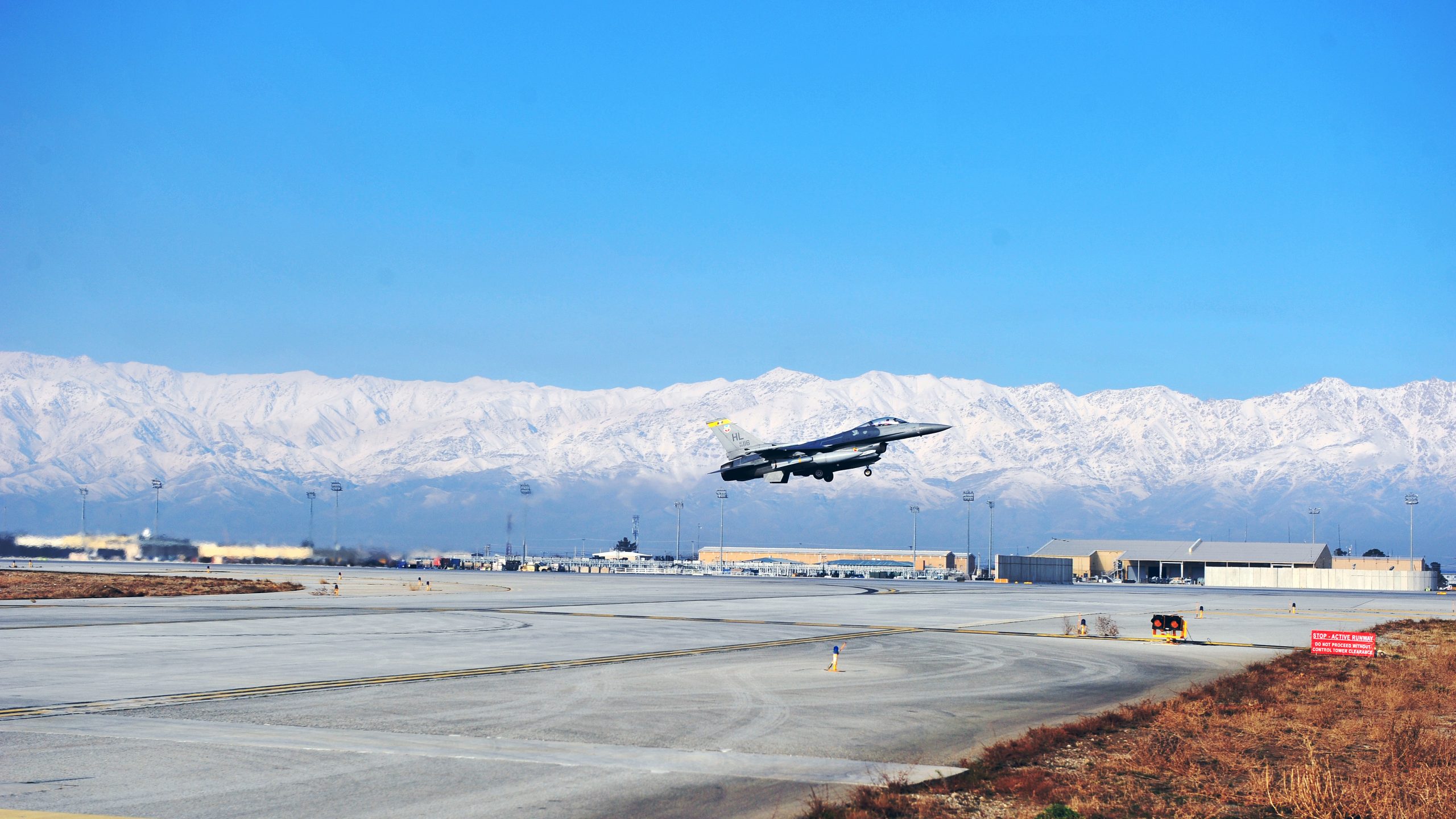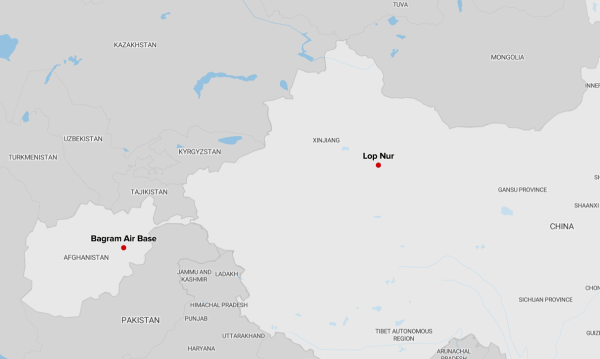
The Bagram base, once the heart of the US war in Afghanistan, has re-emerged as a flashpoint in global geopolitics. For Donald Trump, it’s not just a military facility—it’s the key to controlling resources, countering China, and projecting power across Asia. And he’s willing to threaten the Taliban with “bad things” to get it back.
Despite a withdrawal deal signed in Doha in 2020, the former and potential future US president has openly expressed his desire to reoccupy the strategic Bagram Air Base. The Taliban have responded with defiance, vowing to block any return of foreign forces to Afghan soil.
But why is this remote base so important to Washington? The answer lies in four pillars of US imperial strategy: geopolitical positioning, resource theft, regional influence, and overwhelming military capacity.
1. A Front-Row Seat to Contain China
Bagram is more than an Afghan base—it’s a potential US listening post just 500 miles from the Chinese border. In Washington’s new Cold War against Beijing, this proximity is priceless. The base would allow the US to monitor Chinese military activity in Xinjiang, track missile tests, and project power into Central Asia—a region China is integrating through its Belt and Road Initiative.
For a US deep state obsessed with “containing” China, Bagram is the perfect unsinkable aircraft carrier on Beijing’s doorstep.

2. Plundering Afghanistan’s $3 Trillion Mineral Bounty
Beneath Afghanistan’s soil lies one of the world’s last great untapped mineral treasures: an estimated $3 trillion in lithium, copper, gold, iron, and rare earth elements. Afghanistan’s lithium reserves alone rival those of global leaders like Chile and Argentina.
Who controls Bagram controls access to these resources. In the race for green energy dominance, these minerals are not just commodities—they are strategic weapons. The US wants to deny them to China and fuel its own tech and defense industries. This isn’t development; it’s 21st-century colonialism.
3. A Wedge Against Russia, Iran, and Regional Sovereignty
Central Asia is a chessboard where the US, Russia, China, and Iran vie for influence. By re-establishing a fortress in Bagram, Washington aims to:
-
Disrupt regional integration led by China and Russia.
-
Pressure Iran from its eastern flank.
-
Monitor and intimidate Pakistan.
It’s a classic imperial move: plant a military flag to dominate the neighborhood and block the rise of independent power centers.
The spokesperson for Russia’s Foreign Ministry, reacting to Trump’s statements, said that the United States left Afghanistan in a shameful manner.
She added that although Bagram air base is a tempting target, the struggles of the Afghan people against NATO show that they will not give up their national sovereignty.
Maria Zakharova stated: “The Bagram air base, located near Kabul, has been renovated and is undoubtedly considered a tempting target. But Washington knows well that the Afghan people, who fought NATO forces for their freedom, will not abandon their national sovereignty.”
Iran also reacted to Trump’s comments. The Secretary of Iran’s Supreme National Security Council, citing earlier remarks by Amir Khan Muttaqi, the Foreign Minister of the Islamic Emirate, said that the Emirate is not willing to give Afghanistan’s land to the United States.
Ali Larijani further added that U.S. presence in the region would face resistance and that bombings and military campaigns in the region would be deadly for American soldiers.
He said: “Why should they come? What does it mean that they want to seize Bagram airport? In my view, this issue will not be resolved so easily, and it will also be costly for the Americans themselves. The American people must decide whether they want to constantly hold funerals for their children or not. If they do, then let them come, invade countries, and fight.”
The Islamic Emirate has so far not commented on other countries’ statements about the Bagram air base. However, earlier, Fasihuddin Fitrat, Chief of Staff of the Ministry of Defense, responding to Trump’s remarks, said that any deal over even “one inch” of the country’s land is unacceptable.
Jamil Shirwani, a political analyst, also said on the matter: “They will not come by force and pressure; they don’t have the ability to come, and even they themselves don’t have the demand to re-enter Afghanistan militarily.”
Earlier, China also reacted, stating that fueling tensions and creating confrontation in the region does not have public support. Lin Jian, spokesperson for China’s Foreign Ministry, stressed that his country respects Afghanistan’s independence, sovereignty, and territorial integrity.
4. Unmatched Military Capacity for Regional Wars
Bagram isn’t a simple airstrip. It’s a massive war hub with two long runways capable of handling the largest US bombers and cargo planes like the C-5 Galaxy. It served as the central nervous system for the 20-year occupation, and the Pentagon dreams of using it again as a launchpad for interventions across South Asia and the Middle East.
In short, Bagram allows the US to strike fast, far, and with devastating force—anywhere, anytime.
For Washington, the base’s strategic logic is clear. From Bagram, the United States could oversee counterterrorism operations, track regional militancy, and monitor Chinese and Russian activity. But the operational feasibility of returning is slim. Militarily seizing Bagram would mean re-invasion, with all the troop deployments, logistics, and costs that toppled three empires before. Diplomatically, the price would be high: recognition of Taliban rule, lifting of sanctions, or large-scale aid – concessions that are potentially toxic in Washington.
History also cautions against optimism. From the British retreats of the 19th century to the Soviet defeat in the 1980s and the US exit in 2021, foreign powers have learned the same lesson: Afghanistan cannot be held without local consent.
Bagram’s strategic importance is unquestionable, but in Afghan politics, symbols matter as much as runways. For the Taliban, ceding the base would be a humiliation, undermining the sovereignty they fought to reclaim.
Trump’s call, then, seems more rhetorical than practical. It signals a desire to reassert US influence in a region increasingly shaped by Chinese and Russian engagement. It may also be a way of further prodding the record of the Biden administration. But the Taliban’s rejection, coupled with their international backing, makes a negotiated return highly unlikely. The alternative – military force – would be prohibitively costly and politically untenable. https://www.lowyinstitute.org/the-interpreter/what-chance-does-trump-have-negotiating-bagram-airbase-deal-taliban
The Cost of Imperial Arrogance
Returning to Bagram would be a catastrophic miscalculation—one that repeats every US failure since 2001.
-
Financial Drain: Billions more taxpayer dollars would be wasted on rebuilding a base only to lose it again.
-
Human Toll: More dead soldiers, more traumatized veterans, and countless more Afghan civilians caught in the crossfire.
-
Political Blowback: Trump campaigned on “America First” and ending endless wars. Reoccupying Bagram would be a naked betrayal of his voters and proof that the war machine controls US policy, no matter who is president.
The American people are tired of war. The Taliban will not surrender sovereignty. And the world is watching—no one is buying Washington’s lies anymore.


Your point of view caught my eye and was very interesting. Thanks. I have a question for you.
What’s your question?